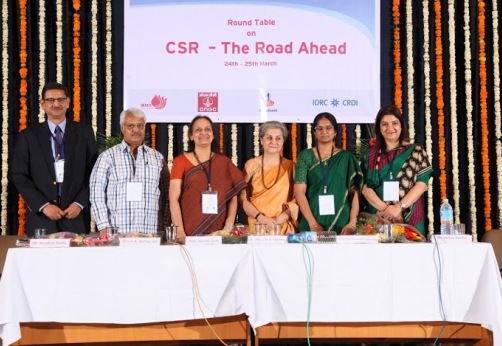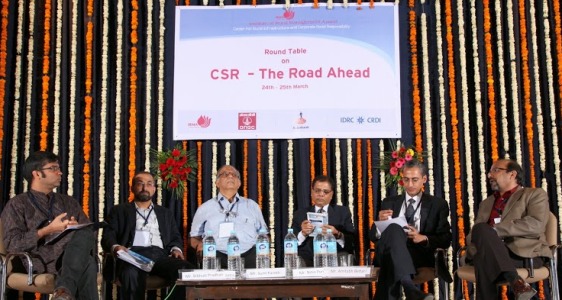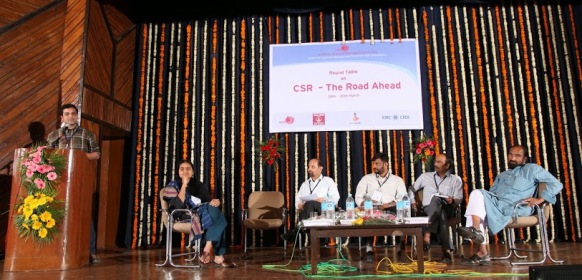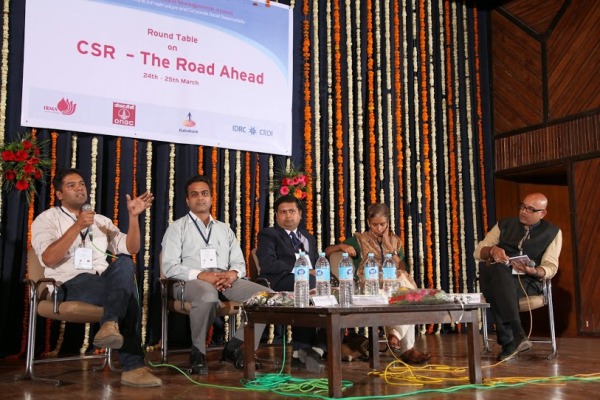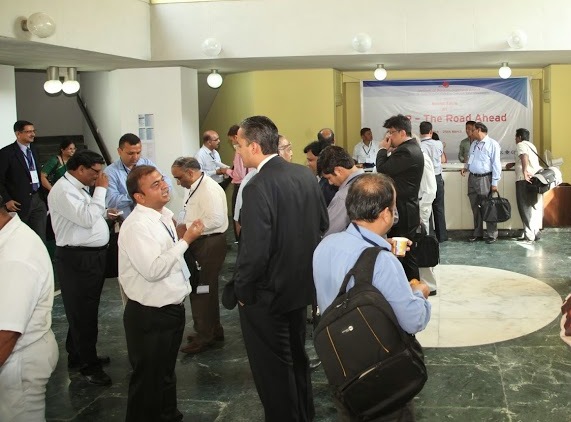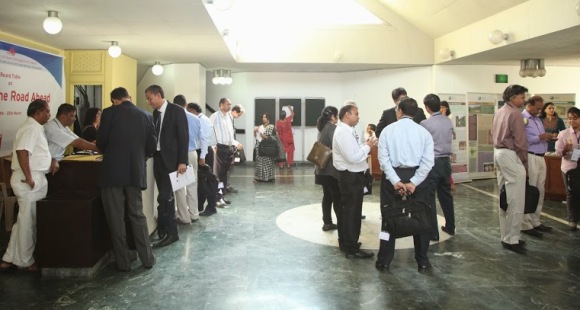It has been over two weeks, but unlike other conferences and seminars, the discussions that started at CSR Round Table are still on. Individuals who participated in the talks, made presentations, brainstormed and networked at the conference are now engaging in conversations through emails, telecons and one-on-one meetings – some of them are even collaborating to address the discussed issues as well as conceptualize practical and impactful social programmes.
Organized by Centre for Rural Infrastructure and Corporate Social Responsibility, Institute of Rural Management Anand (IRMA), the Round Table was attended by professionals from development sector, corporate social responsibility (CSR) leaders, government officials, academia, relevant media as well as representatives of non-government organizations.
Prof. Jeemol Unni, director, IRMA, introduced the new mandatory CSR norms as well as presented the current scenario of uncertainty, with companies as well as the development sector not being so sure if the mandatory CSR spends would bring about the desired change. Dr Syeda Hameed, member, Planning Commission, took a cue from this and stressed the need of inclusiveness and collaborations in order to achieve effective implementation of social programmes. She did not hesitate in lamenting the Government’s near ineffectiveness in combating issues related to women, particularly women’s health, and said civil society must be encouraged to play an effective role in this regard. Prof. Nimruji Prasad of Indian Institute of Management (IIM), Kolkata, also underlined the significance of shared values.
The talks shifted from the new law to sustainability practices of companies when Arindom Datta, senior director and country head of Rural Development Banking (Rabobank), pointed out how sustainability should be embedded in businesses’ action plans. The sustainability pitch was intensified by Vanita Kumar, group general manager and corporate head of CSR at ONGC, when she pointed out how, in some cases, CSR did not make much sense when the purpose and the nature of business itself became questionable.
The thoughtfully woven agenda for discussion on Day 1 covered several relevant aspects, starting from the most pertinent definition of CSR to understanding of the mandatory law, to approaches toward making CSR impactful and meaningful. Day 2 took the discussions to another level with Dr KK Upadhyay, head CSR at FICCI, moderating a session where the significance of stakeholders in CSR was underlined. Upadhyay took up the clauses in Schedule 7 of Companies Act to present how almost every social aspect had been covered and how each individual in the development sector as well as the corporate world was an important stakeholder. Joe Madiath, who closely works with the poor populace in Orissa, pointed out that the CSR programme beneficiaries too should be seen as stakeholders”instead of being considered as just experimental subjects. He stressed the need to devise programmes wherein the dignity of individuals, especially the underprivileged and the poor, was not compromised.
The next session flowed logically from the previous one as it focussed on the approaches to measure CSR and assessing its impact. Vishnu Swaminathan, country director, Ashoka, moderated the session wherein Ranjan Rayna of CauseBecause raised his concern over reporting frameworks and ratings that graded all types of companies across sectors on the same metrics. He pointed out that companies that made products that were not healthy or acceptable did not deserve sustainability ratings.
The Round Table concluded with a session wherein speakers stressed the need of professionals in CSR. The panel agreed that higher educational institutions would have to play a significant role in creating a relevant resource pool backed with knowledge and training. The panel appreciated IRMA’s efforts in this regard and expressed hope that more knowledgeable and trained professionals would come out of the institution to efficiently steer social and development programmes across the country.
The panellists and speakers who kept the audience hooked on for two days at the Round Table included: AK Verma, member secretary, Gujarat Ecological Commission; Neelima Khetan, general manager, CSR & Sustainability, at Coca-Cola India; Amitabh Behar, executive director, National Foundation of India; Arindom Datta, country head, rural development banking, at Rabo Bank; Bibhuti Pradhan, Indian Oil; Nitin Puri, country head, Yes Bank; Apoorva Oza, AKRSP; Rajendra Joshi, SAATH; Akash Sethi, Quest Alliance; Ramakrishna Mistry, Jan Vikas; P Raghu, Action Aid; Aarti Madhusudan,Governance Counts; Sushma Iyengar, Kutch Nav Nirman; Mehul Chauhan, Xavier Institute of Development Action & Studies; Anand Kumar, Christian Aid; Rishi Pathania, head CSR, UPL Ltd; Meher Gadekar, CSR consultant; Sushama Oza, Adani Foundation; and JP Lohiya, ONGC Cambay.


